Language philosopher Ludwig Wittgenstein once wrote, “The limits of my language mean the limits of my world.”
Wittgenstein knew that his world was limited to the words he could use to describe it. This has been borne out through more methodical tests, like those performed by Johnson O’Conner. For over two decades he performed a variety of experiments to establish what factors turn a person into a success. The one factor that Johnson found to predict success, taking other variables into account, was vocabulary size. The larger the vocabulary, the better chances that the person would find their way into the C-Suite. The earlier children begin building vocabulary, the better their chances are for success in life.
Children start to understand words at 12-18 months, absorbing everything they hear. As they get older, they benefit from having their vocabulary expanded with more complicated words. By the time they are ready to start preschool and kindergarten, their vocabulary is advanced enough that they need to have discussions that improve their word knowledge. Kindergarten is the time when vocabulary differences become evident. A child from an affluent family will understand nearly twice the words that a child from a poor family. This is a gap that, if left unchecked, affects student learning.
Fortunately, many strategies are available to close that gap.
- Teach children words directly. Vocabulary lists belong in the classroom. Teaching students five to ten words a week, especially ones that are related to other lessons, vastly improves student vocabulary. This helps them build their language skills over time, up to 6,000 more words through graduation.
- Teach children words indirectly. Vocabulary lists help expose students to new words. Lists give a child a decent cushion, but they need more than that to succeed in higher education. Expand vocabulary to all lessons by using words with similar meanings through the day.
- Use words in context to make them interesting. Teaching vocabulary without context makes it difficult to understand their meaning. Putting vocabulary list words into sentences and other lessons provide examples to students how the word is used. This technique is another way to build their confidence in the words they are using.
- Repeat words over and over. Students require hearing the word over and over, up to fifteen times before they become comfortable using them. With all of the repetition of certain words during the day, their vocabulary will grow without them even knowing it.
- Encourage use of new vocabulary. Have students draw pictures of the new words. Play a game using the words as answers to questions. Activities that make students more comfortable with the vocabulary that is taught improves the chances they absorb and use those words.



